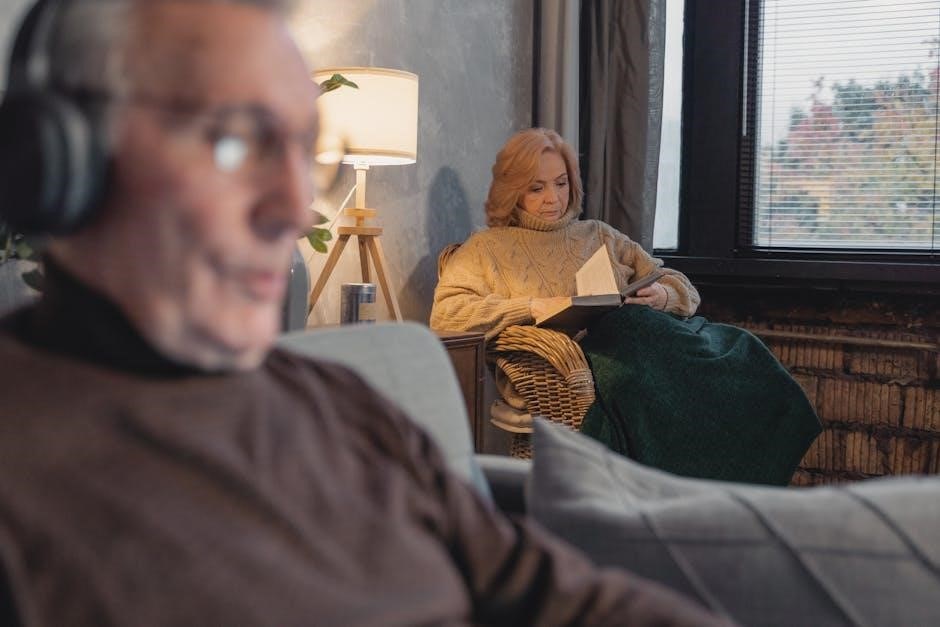Chinua Achebe’s seminal novel‚ Things Fall Apart‚ is widely acclaimed for its profound portrayal of pre-colonial Igbo society and the impact of British colonialism. The story follows Okonkwo‚ a respected wrestler and leader‚ as his life and culture are disrupted by external forces. Available as a free PDF download‚ the novel remains a vital resource for understanding cultural conflict and identity. Its timeless themes resonate globally‚ making it a cornerstone of world literature.
Overview of the Novel
Things Fall Apart‚ written by Chinua Achebe‚ is a groundbreaking novel that explores the complexities of pre-colonial Igbo society in Nigeria. Published in 1958‚ it tells the story of Okonkwo‚ a respected wrestler and leader‚ whose life is shaped by tradition‚ ambition‚ and the challenges of cultural upheaval. The novel vividly portrays the societal norms‚ values‚ and struggles of the Igbo people‚ while also delving into the personal journey of its protagonist. It remains a seminal work in world literature‚ offering insights into the clash between tradition and modernity.
Historical Context of the Story

Things Fall Apart is set in the late 19th century‚ during the early stages of British colonialism in Nigeria. The novel captures the transition of Igbo society from its traditional structure to the disruptive influence of European colonizers. Achebe vividly portrays the social‚ cultural‚ and political changes that occurred during this period‚ highlighting the tension between indigenous traditions and the imposition of foreign values. This historical backdrop provides a rich context for understanding the novel’s exploration of cultural identity and colonial impact. The story reflects the broader African experience during this tumultuous era.

Plot Summary of “Things Fall Apart”
Things Fall Apart traces Okonkwo’s journey from a respected wrestler to his downfall amidst colonial disruption. The novel explores his struggles with tradition‚ family‚ and cultural upheaval.
Setting of the Novel
The novel is set in late 19th-century Nigeria‚ particularly in the fictional village of Umuofia‚ part of the Igbo society. This pre-colonial setting highlights the rich cultural traditions‚ social structures‚ and values of the Igbo people. The story unfolds against the backdrop of the arrival of British colonialism‚ which disrupts the equilibrium of Igbo life. The setting vividly portrays the clash between traditional African customs and the encroaching forces of modernity and colonial rule‚ creating a backdrop for Okonkwo’s personal and societal struggles.
Main Characters and Their Roles
Okonkwo‚ the protagonist‚ is a strong and respected leader in Umuofia‚ known for his wrestling prowess and rigid adherence to tradition. His father‚ Unoka‚ is a contrasting figure‚ embodying weakness and failure in Okonkwo’s eyes. Ekwefi‚ Okonkwo’s second wife‚ and Ezinma‚ their daughter‚ play crucial roles in challenging Okonkwo’s strict masculinity. Obierika‚ Okonkwo’s best friend‚ offers a voice of reason and empathy‚ while the Reverend Smith and Mr. Brown represent the intrusive colonial forces. These characters collectively explore themes of cultural identity‚ masculinity‚ and the impact of colonialism.
Key Events and Turning Points
Okonkwo’s accidental killing of a clansman during a funeral leads to his exile‚ marking a turning point in his life. During his seven years in exile‚ British colonizers arrive‚ disrupting Igbo traditions and introducing Christianity. Upon his return‚ Okonkwo finds his village transformed‚ with many embracing colonial rule. Faced with the destruction of his culture‚ Okonkwo ultimately takes his own life in a final act of defiance. These events underscore the clash between tradition and colonialism‚ highlighting the tragic consequences of cultural upheaval.

Themes in “Things Fall Apart”
The novel explores cultural conflict‚ colonialism’s impact‚ and the clash between tradition and change. It delves into masculinity‚ identity‚ and societal transformation‚ offering profound insights into human resilience.
Cultural Conflict and Colonialism
Chinua Achebe’s Things Fall Apart vividly portrays the clash between Igbo traditions and British colonialism. The novel highlights how colonial forces disrupted the social fabric of Umuofia‚ leading to cultural erosion. Okonkwo’s struggles symbolize the broader resistance and eventual decline of indigenous customs. The PDF version of the book offers a detailed exploration of these themes‚ providing readers with a historical perspective on the devastating effects of colonialism on African societies and their cultural identities.
Tradition vs. Change in Igbo Society

Chinua Achebe’s Things Fall Apart explores the tension between tradition and change in Igbo society during the late 19th century. The novel vividly depicts the rigid cultural practices of the Igbo people‚ such as their religious beliefs‚ social hierarchies‚ and communal values. However‚ the arrival of British colonizers and Christianity disrupts this traditional way of life‚ forcing the community to confront modernity. This conflict is central to the story‚ as characters like Okonkwo struggle to uphold their customs in the face of overwhelming change‚ leading to a tragic exploration of cultural identity and resilience.
The Role of Masculinity and Identity
Masculinity plays a central role in shaping identity in Things Fall Apart. Okonkwo‚ the protagonist‚ embodies traditional Igbo ideals of strength and dominance‚ avoiding any display of weakness. His identity is deeply tied to his achievements as a wrestler and provider‚ reflecting societal expectations of manhood. However‚ his rigid adherence to these ideals leads to personal and familial struggles‚ highlighting the complexities of masculinity. The novel critiques toxic masculinity while exploring how cultural expectations shape individual identity‚ offering a nuanced portrayal of gender roles in Igbo society.
Historical and Cultural Significance
Things Fall Apart is a landmark novel that challenges stereotypes of African cultures‚ offering a vivid portrayal of pre-colonial Igbo society. Its exploration of colonial impact remains deeply influential in post-colonial literature‚ shaping global understanding of cultural identity and resilience.
Depiction of Pre-Colonial Igbo Life
Chinua Achebe’s Things Fall Apart vividly portrays pre-colonial Igbo society‚ highlighting its rich cultural practices‚ social structures‚ and communal values. The novel explores the Igbo people’s deep connection to their land‚ traditions‚ and spirituality. Achebe details the intricate customs‚ such as village gatherings‚ religious rituals‚ and the role of elders‚ offering a nuanced view of life in Umuofia. The protagonist‚ Okonkwo‚ embodies the cultural ideals of strength and masculinity‚ while the community’s collective identity is shaped by shared history and oral traditions. This depiction challenges colonial narratives and celebrates Igbo heritage.
Impact of British Colonialism
The arrival of British colonizers in Igbo land brought drastic changes‚ disrupting the traditional way of life. Achebe illustrates how colonialism eroded Igbo cultural practices‚ imposed foreign religions‚ and destabilized social structures. The imposition of Christianity and Western education undermined the authority of local leaders like Okonkwo‚ leading to cultural disintegration. Economic exploitation and the introduction of a new legal system further fractured the community‚ highlighting the destructive impact of colonial rule on indigenous societies and their identities.

Availability of “Things Fall Apart” in PDF
Things Fall Apart is widely available as a free PDF download on platforms like PDFdrive.to. Readers can access the full novel without registration or payment easily online.
Free Download Options
The PDF version of Things Fall Apart is available for free download on various platforms like PDFdrive.to. Readers can access the full novel without registration or payment‚ ensuring easy and instant access. These downloads often include the complete text‚ allowing readers to explore Okonkwo’s story and the cultural themes Achebe portrays. This accessibility makes the novel reachable to a global audience‚ fostering a deeper understanding of Igbo culture and colonialism’s impact.
Importance of Reading the Novel
Things Fall Apart is a cornerstone of world literature‚ offering insights into pre-colonial Igbo culture and the disruptive effects of colonialism. Reading the novel provides a deeper understanding of cultural identity‚ tradition‚ and the human experience. Its themes of resilience and change resonate universally‚ making it essential for students‚ scholars‚ and general readers. The novel’s availability in PDF format ensures accessibility‚ allowing global audiences to engage with Achebe’s powerful narrative and reflect on its relevance in modern times.
Analysis of Major Characters
Okonkwo‚ the tragic hero‚ embodies strength and tradition‚ while his downfall highlights cultural conflict. Other characters like Nwoye and Ekwefi reveal complexities of Igbo society and change.

Okonkwo: The Tragic Hero
Okonkwo‚ a respected Igbo leader‚ embodies strength and tradition but struggles with emotional depth. His rigid adherence to cultural norms and fear of weakness lead to his tragic downfall. His rise as a wrestling champion and provider contrasts with his impulsive decisions‚ such as killing his adopted son. Okonkwo’s defiance against colonialism highlights his pride‚ but it also accelerates his demise. His story‚ detailed in the PDF version of Things Fall Apart‚ illustrates the devastating impact of colonialism and personal flaws on a heroic figure.
Other Key Characters and Their Influence
Obierika‚ Okonkwo’s wise and empathetic friend‚ serves as a voice of reason and moral balance. Ekwefi‚ a strong-willed woman‚ embodies resilience through her challenging marriage and devotion to her daughter‚ Ezinma. Nwoye‚ Okonkwo’s son‚ represents the struggle between tradition and change‚ ultimately embracing Christianity. Mr. Brown and Reverend Smith symbolize the intrusive yet differing approaches of colonialism. These characters enrich the narrative‚ highlighting the complexities of Igbo society and the disruptive forces of colonialism‚ as detailed in the PDF version of Things Fall Apart.
The Title and Its Inspiration
Connection to W.B. Yeats’ Poem
The title Things Fall Apart is inspired by W.B. Yeats’ poem The Second Coming‚ reflecting the chaos and disorder as colonialism disrupts Igbo culture‚ as seen in the PDF version.
The title Things Fall Apart draws inspiration from W.B. Yeats’ poem The Second Coming‚ specifically the lines‚ “Things fall apart; the centre cannot hold; Mere anarchy is loosed upon the world.” Achebe uses this reference to illustrate the collapse of Igbo traditions and social structures under British colonialism. The poem’s themes of chaos and disorder mirror the novel’s depiction of cultural disintegration. This connection is evident in the PDF version of the book‚ highlighting Achebe’s deliberate choice to evoke the poem’s imagery of societal unraveling.

Symbolism in the Title
The title Things Fall Apart is rich in symbolism‚ reflecting the disintegration of Okonkwo’s life and the Igbo society’s collapse. It signifies the unraveling of traditional values under colonial influence‚ as seen in the PDF version; The phrase “things fall apart” metaphorically represents the loss of cultural identity and social cohesion‚ while “the centre cannot hold” suggests the erosion of central values. This symbolism underscores the novel’s exploration of change‚ conflict‚ and the inevitable shift from tradition to modernity.

Legacy and Reception of the Novel
Things Fall Apart is a landmark in African literature‚ widely studied globally. Its exploration of cultural identity and colonialism has made it a classic‚ available as a PDF for easy access‚ ensuring its enduring influence and relevance in understanding historical and social dynamics.
Impact on World Literature
Things Fall Apart revolutionized world literature by offering a powerful African perspective‚ challenging stereotypes and enriching global understanding of diverse cultures. Its vivid portrayal of pre-colonial Igbo society and the clash with colonialism resonated universally‚ making it a cornerstone of postcolonial studies. As one of the first African novels written in English to gain global acclaim‚ it inspired countless authors and remains a vital text in educational curricula worldwide‚ shaping discussions on cultural identity‚ colonialism‚ and human resilience.
Modern Relevance and Reviews
Despite being published over six decades ago‚ Things Fall Apart remains remarkably relevant today‚ resonating with contemporary themes of cultural identity‚ colonialism‚ and social change. Readers and scholars continue to praise its profound exploration of human resilience and societal transformation. The novel’s timeless appeal is evident in its consistent presence on bestseller lists and in academic syllabi. Reviews highlight its enduring ability to provoke thought and empathy‚ solidifying its place as a modern classic in world literature.
